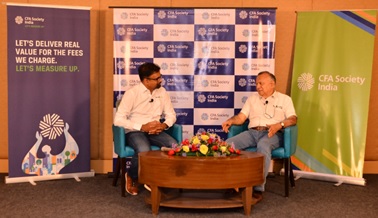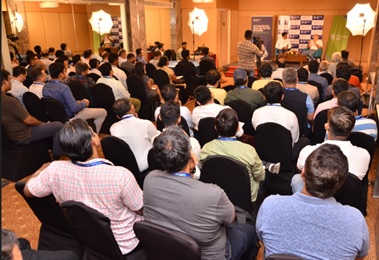- November 10, 2023
- Posted by: CFA Society India
- Category:BLOG, Events
Speaker - Mr. Anil Kumar Goel, Value Investor
Moderator - Mr. Shyam Sekhar, Ideator and Founder, ithought Financial Consulting LLP
Contributed by - Himanshu Dugar
Chennai is home to super investors who like to stay away from media and the limelight. It explains the packed crowd at the event hosted by CFA Society India, Chennai Chapter “Meet the Market Masters” featuring Mr. Anil Kumar Goel.
Anil Goel is known for his investments in commodity sectors, his unique perspective on the markets, which seems common sense to him but is usually contrary to the market at large, and his KCPLTD mantra. His simple lifestyle and humbling attitude accentuate his investing style.

Highlights from the session that was moderated by Mr. Shyam Sekhar
From trading steel products to a full-time investor:
Born and brought up in Punjab, Anil Goel came to Chennai at the age of 16 for a long holiday but ended up joining his grandfather’s steel trading business. As a businessman with keen observation of surroundings, he thought people were ignoring common sense when market sentiment was overly bullish in the early 90s. He predicted a steep correction in 1992. The successful outcome of this prediction led to his plunge into the stock markets in April 1993 believing markets cannot go down beyond a point. He made money in the ensuing rally. However, his aggressive bets on GDRs of Indian companies washed out most of his portfolio by 1996. This pushed him into doing equity research and in 1998, he re-entered the markets and soon turned into a full-time investor. His business acumen helped him understand businesses across different sectors while his .
Investment Philosophy: Knowledge, Conviction, and Patience
Initially, Anil Goel followed the Graham style chasing stocks with real assets available at a discount to intrinsic value. Once dividends became tax-free, he shifted focus to companies with strong dividend growth visibility and investing in ones available at high yields. Currently, he focuses on sectors like sugar, power, and textiles where he has built a deep understanding of the businesses and the value chain and has remained invested through cycles.
What stands out is that he invests only on ideas where he has built his conviction. He says, “Investment ideation must be natural vs borrowing from others. If an idea strikes me, I will look into it but not buy without building a deep conviction”
As he states in his mantra KCPLTD: Build deep Knowledge of the business, Conviction in your assessment, and Patience for the market giving you Luck and the nerve to Timely Deploy when prices come down.
Portfolio Construction and Exit Strategy:
Anil Ji’s core portfolio consists of 20 companies with 80% allocation. He also has a pool of 70-80 companies with token positions cumulating to 5% of the portfolio called the testing lab. The remaining 15% allocation is into 5 companies that have been upgraded from the testing lab.
Selling: Once the price target is reached, start selling with a small quantity. Every next sale will be double the original quantity. This way, the average selling price will go up and you can sell closer to the peak.
One of his exit styles is switching, this involves replacing an existing investment with another company in the same sector trading at lower valuations.
Learnings over the years:
- “You can make more money by investing in sectors ignored by markets because they are available at throwaway prices. Once, the euphoria hits, you make the highest money”
- Focus on companies where the dividend can compound. Such companies have been better capital allocators and have witnessed significant value creation due to multiple expansion.
- Prefer small companies as they are easier to understand and have higher return potential vis-a-vis large companies.
- “I don’t look at overall market valuation, index, etc, I only look at my companies.”
- Do not compare your performance with others – “If I had done that, I wouldn’t have been buying old economy companies in 2000”
- Do not invest with borrowed conviction. Ideas may come from anywhere, but before buying you should be fully convinced about the opportunity.
- Do not invest in companies where you cannot understand the business or fall outside your circle of competence.
- Think more, process the information you collect, and have clarity in mind.
Excerpts from Audience Q&A:

Q: You have played cycles in steel and auto ancillaries but remained invested throughout cycles in sectors like sugar and power?
AG: In auto ancillary stocks, I have bought at bottoms and sold at peaks as I try to go against the consensus. In Sugar, I watched 2 cycles from the sidelines, entered the 3rd cycle, and continued to remain invested. My conviction here is on the ethanol story and I will wait until 2024-25 when the ethanol story fully matures.
Q: How do you assess promoter/management quality?
AG: When I decide to do a large investment, I interact with the promoter. My business experience helps in assessing the person. I have noticed that there are promoters who only focus on their business and are not bothered by stock value while there are some who only look at stock value. Another factor could be how much money is being withdrawn in salaries etc. Capital allocation and dividend policy are other important factors. If the company is only holding cash, its ROCEs will be lower and drag their multiples as well.
Q: How do you stay invested when your holdings have corrected by 60-70%? When there are CG questions in your investee companies?
AG: I have seen my portfolio crashing to 20% of its value in 2008 and in COVID it became 25% of what it was, but I have also seen many times that the prices go back up also. Having clarity of mind and emotional temperament has helped me stay invested in these times. You need to have the conviction and patience in your investment. If your understanding of the business and the assets of the company is deep, you will find it attractive when it falls so sharply. I have bought when stocks where on lower circuit.
If the company has real assets and cash flows and you know the business, then promoter/mgt is secondary. You should check if they are stealing money from the company, then that is a problem.
Q: How does your usual day look like?
AG: I wake up by 3 am; go for a walk for at least 1hr followed by 1hr of Yoga. Ready for the market at 8:45 and shut off with a short nap at 4 PM. I like Indian food only. Have dinner at sunset and sleep by 9 PM. I don’t read any investment books or research reports, haven’t watched TV for 5-6 yrs now.
